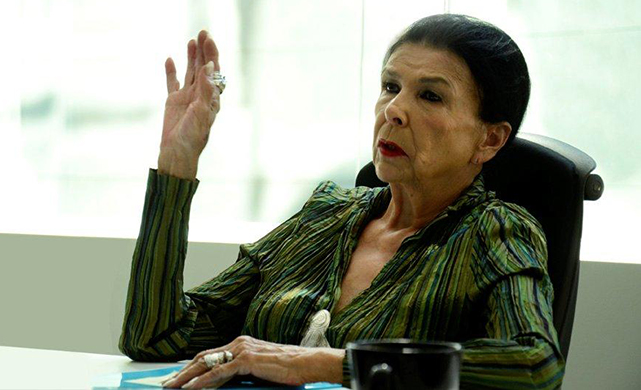Alanis Obomsawin celebrates 50th film

By Barb Nahwegahbow
TORONTO- Internationally-renowned documentary filmmaker Alanis Obomsawin, Abenaki Nation celebrated a number of milestones this year – her 85th birthday, 50 years with the National Film Board, and the completion of her 50th film. Our People Will Be Healed had its world premiere at the Toronto International Film Festival in September and screened to a sold-out house at the Jackman Hall Theatre at the Art Gallery of Ontario. Obomsawin was greeted with a thundering standing ovation as she took the stage both before and after the screening.
Obomsawin is known for her hard-hitting documentaries critical of government policies related to Indigenous people. In an interview a couple of days before the premiere, she said, this film is different from all the others I’ve done. “Indian Affairs will have a heart attack when they see I’m not putting them down and not criticizing,” she said, laughing. “Everything I’ve done, I never praise them, I always complain.”
Our People Will Be Healed is about a community that puts children first, particularly in the education system they’ve developed. Norway House Cree First Nation, a northern community located 450 km north of Winnipeg has developed a system that honours their children, celebrates their gifts and nurtures their potential.
“I never thought I would see this in my lifetime,” Obomsawin said. “That’s the greatest gift to me, that I’ve lived long enough to see such changes. That’s why I’m so excited… everything they do is for the children. It’s so beautiful.”
The film introduces us to the leaders, the teachers, the school principal, community members. They are visionaries, all of them. Chief Ron Evans has made social development a priority for his community, “ensuring our people are treated with respect, making sure they get educated and trained.” That includes an educational system that nurtures gifts and instills confidence in the students through a carefully designed curriculum and policies.
The Helen Betty Osborne School is named after a 19-year old woman from the community who was kidnapped and murdered in 1971, a brilliant student whose dream was to become a teacher. It’s a beautiful building, said Obomsawin, full of light and circular rooms.
The school accommodates nursery school to grade 12. Half of the school’s 84 teachers are Indigenous and most of them are from Norway House, says Agnes Mowat, the principal. The school’s teaching assistants are from the community.
Along with the standard academic subjects, there is a strong Indigenous studies element in the curriculum. As Dennis Day, the Cree language teacher for nursery to grade one puts it, it’s important to teach our kids about their treaty rights and their Aboriginal rights and their language and their culture, because if they don’t know these things, “then they don’t know [when] something’s being taken away.”
Cultural adviser Gordon Walker puts it another way, “If we’re going to proclaim who we are, we have to have our ceremonies and our language, the two things that make a sovereign nation.” One of the things Walker does is take the young people out on the land to renew their connection with the land. It’s a means of healing and finding their way back to what was stolen from them. He’s brought the Sundance Ceremony back to the community and we’re allowed a veiled glimpse into the beauty and power of this ceremony.
Obomsawin interviews young students who share their plans for the future. They dream of going to university, becoming scientists, professional hockey players or RCMP officers. They’re proud of their school and proud of their accomplishments. The school has taken important measures to increase the rate of high school completion and it’s working.
There are so many moments of sheer joy in the film. Perhaps the most beautiful is the Annual Jamboree hosted by Norway House in 2016 that brought together 500 students for fiddle performances. Music is an important part of the curriculum at Helen Betty Osborne School and the students have demonstrated a wonderful talent for playing the fiddle. When the camera is on the faces of the students playing the fiddle, one can see trepidation and intensity at first, then satisfaction, relaxation and joy as each one of them realizes, ‘I can do this and I can do it well’.
Obomsawin hopes Norway House can serve as a model for other communities. “There’s so much love in this film,” she said in the interview, “and it’s for the children. I call the children the kings because they come first.” Norway House has shown how love can triumph over colonialism.
Our People Will Be Healed will screen at the imagineNATIVE Film Festival in Toronto on October 21. For tickets, go to www.imaginenative.org.

